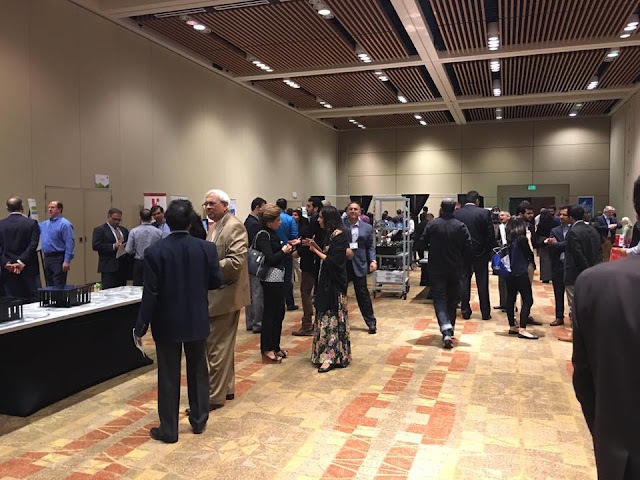PakAlumni Worldwide: The Global Social Network
The Global Social Network
OPEN Silicon Valley Forum 2017: Pakistani Entrepreneurs Conference
Open Forum 2017, the annual conference of Pakistani entrepreneurs in Silicon Valley, drew over 1,000 attendees, about half of them women. It featured presentations by successful entrepreneurs including Ahmad Khaishgi of SquareTrade and Mudassir Sheikha of Careem as well as sessions by powerful venture capitalists like Aaref Hilaly of Sequoia Capital. It is organized by the Organization of Pakistan Entrepreneurs in Silicon Valley (OpenSV). In addition to entrepreneurs, the attendees were venture capitalists, bankers, accountants, lawyers and high-tech executives coming together at the Santa Clara Convention Center on Saturday, April 29, 2017.
A variety of topics raging from cloud computing and virtual reality to internet of things (IoT) and sharing economy were discussed in three parallel tracks at the conference. A session that drew special attention was titled "Pakistan's Thriving Startup Ecosystem" that featured Fahad Aziz, Khurram Jamali, Konstantinos Papamiltiadis and Ather Imran Nawaz.
I was drawn to two conference sessions in particular: cloud computing and internet of things (IoT). The choice was guided by my own interest in these topics.
Cloud Computing:
Tariq Shaukat, President of Google Cloud, was the featured speaker in this session.
What is cloud computing? The last few years have seen a major shift from to old client-server to the new cloud computing model in information technology. Companies are shunning their own in-house IT infrastructure in favor of renting services from data centers operated by cloud companies like Amazon, Google and Microsoft which also offer their proprietary application programming interfaces (APIs) and frameworks to support applications.
Tariq talked about a variety of Google Cloud APIs that include compute, storage, data, machine learning, management, identity and security APIs. He specifically focused on machine learning APIs for vision, speech, language and translation.
Answering my question about portability of cloud applications, Tariq said they provide from apps written to Amazon Web Services (AWS) to Google Cloud. However, he said nothing about ease of porting apps from Google to other competing cloud offerings. Unfortunately, Tariq's presentation looked and sounded more like a sales pitch for Google Cloud than a discussion of cloud computing model itself.
How does it affect IT companies? Among the most affected by cloud computing are the IT outsourcing companies, particularly India-based TCS and Infosys, that relied on back office work for their revenue. The ongoing shift to cloud is now hurting that business.
Internet of Things (IoT):
Naeem Zafar (CEO TeleSense) moderated this panel featuring Ali Sebt (President VIMOC Tech), Nadir Fatehi (CEO Kiana Analytics), Nidhi Kalra (Rand Corp) and Mashood Alam (SAP Labs).
The growth of embedded computing chips in both industrial machines and consumer appliances combined with proliferation of networks are enabling the "Internet of Things" (IoT). Such networked machines collect operational and performance data from built-in sensors that can be analyzed and used to fine tune performance, schedule preventative maintenance, diagnose and fix problems (often remotely) and better manage them for the best results. New revenue models can also be imagined by manufacturers based on the output and the outcomes of such systems.
An example of IoT I heard about recently is in the farm equipment business like tractors and harvesters. Before the advent of IoT and software, most American farmers repaired their own equipment. Now, they must call manufacturers like John Deere to fix it. And they need to sign long term service contracts guaranteeing additional revenue streams for the sellers.
Summary:
Organization of Pakistani Entrepreneurs in Silicon Valley (OPEN SV), led by Ms. Amra Tareen, put on yet another great conference this year that drew over a thousand attendees, about half of them women. It was attended by entrepreneurs, venture capitalists, bankers, accountants, lawyers and high-tech executives coming together at Santa Clara Convention Center on Saturday, April 29, 2017. It featured successful entrepreneurs including Ahmad Khaishgi of SquareTrade and Mudassir Sheikha of Careem as well as powerful venture capitalists such as Aaref Hilaly of Sequoia Capital.
Silicon Valley Pakistani-Americans
Pakistani-American Leads Silicon Valley's Top Incubator
Silicon Valley Pakistanis Enabling 2nd Machine Revolution
Karachi-born Triple Oscar Winning Graphics Artist
Pakistani-American Ashar Aziz's Fire-eye Goes Public
Two Pakistani-American Silicon Valley Techs Among Top 5 VC Deals
Twitter Feed
Live Traffic Feed
Sponsored Links
South Asia Investor Review
Investor Information Blog
Haq's Musings
Riaz Haq's Current Affairs Blog
Please Bookmark This Page!
Blog Posts
Has Pakistan Destroyed India's S-400 Air Defense System at Adampur?
Pakistan claims its air force (PAF) has destroyed India's high-value Russian-made S-400 air defense system (ADS) located at the Indian Air Force (IAF) Adampur air base. India has rejected this claim and posted pictures of Prime Minister Narendra Modi posing in front of its S-400 rocket launchers in Adampur. Meanwhile, there are reports that an Indian S-400 operator, named Rambabu Kumar Singh, was killed at about the time Pakistan claims to have hit it. Pakistan is believed to have targeted…
ContinuePakistan Downs India's French Rafale Fighter Jets in History's Largest Aerial Battle
Pakistan Air Force (PAF) pilots flying Chinese-made J10C fighter jets shot down at least two Indian Air Force's French-made Rafale jets in history's largest ever aerial battle involving over 100 combat aircraft on both sides, according to multiple media reports. India had 72 warplanes on the attack and Pakistan responded with 42 of its own, according to Pakistani military. The Indian government has not yet acknowledged its losses but senior French and US intelligence officials have …
ContinuePosted by Riaz Haq on May 9, 2025 at 11:00am — 32 Comments
© 2025 Created by Riaz Haq.
Powered by
![]()



You need to be a member of PakAlumni Worldwide: The Global Social Network to add comments!
Join PakAlumni Worldwide: The Global Social Network